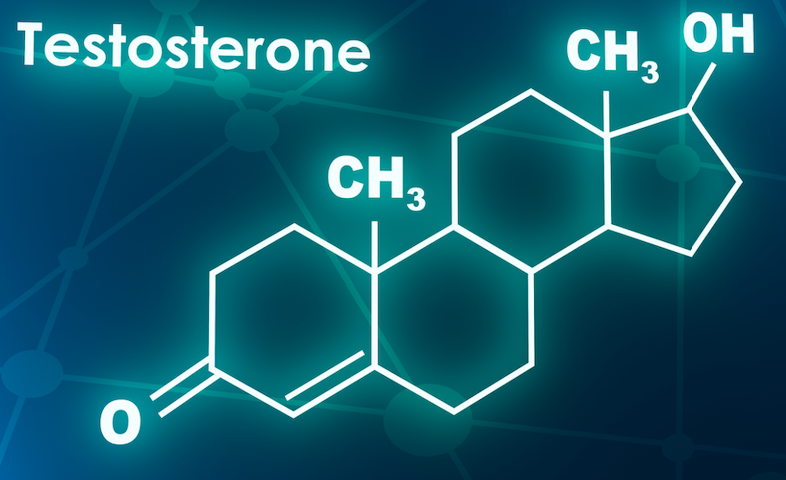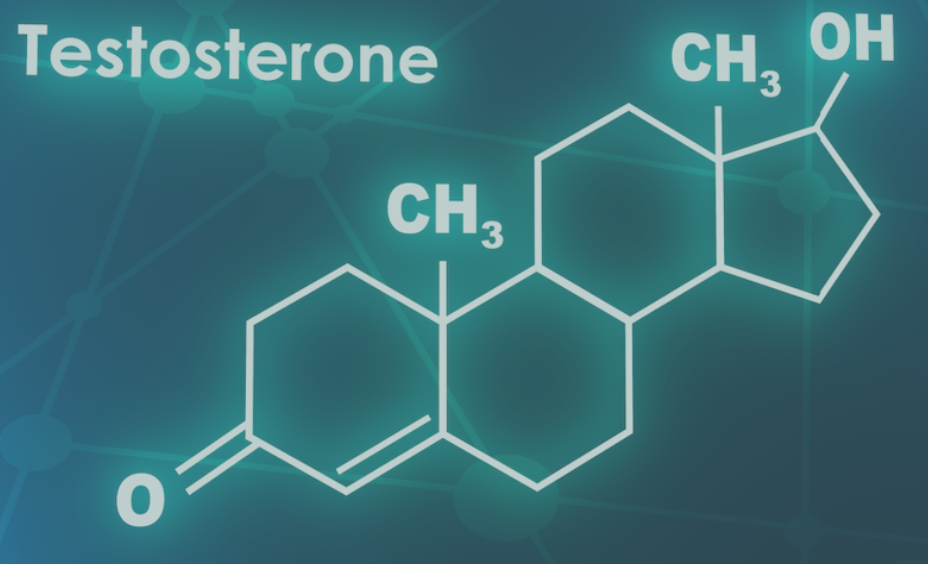Editor’s Note: On a regular basis, I see women, as early as early 40’s whose hormones are very low- all of them, estrogen, progesterone, and testosterone, too. Unfortunately, their hormonal complaints have been dismissed and often mistreated – with Testosterone often being neglected altogether.
Fortunately, for me, my hormone levels are optimal, producing the stamina and drive needed to complete a book, preparing to launch a new webinar, and expanding my coaching practice. It’s with all of this on my plate, that I’m taking a short break writing new blog posts, and revisiting one of my most-read blog posts. I appreciate your grace during this busy time and hope that you stay tuned as my new book -Create The Vitality You Crave- Unlock Your Healing Powers to Optimize Your DNA – is released in the next weeks. You’ll be the first to know the deets. Thanks! Enjoy the reminder about the importance of Testosterone.
Testosterone is an androgenic hormone that is produced in the ovaries, adrenal glands, and fat cells of women. While testosterone (T) is typically associated with men and masculinity, it plays an important role in women’s bodies as well. T levels are naturally, at least 16x higher in men than women yet Testosterone is a key hormone in a woman’s health and well-being… impacting many aspects of her body, including her brain, bone density, and muscle mass.
In my years of working with women, I have been shocked at how often healthcare providers completely overlook testosterone in women. Often Testosterone (T) levels are not even checked not to mention, supplementation offered! I want you to understand how important T levels are, so you can address it with your healthcare provider.

Sexual Function
Testosterone is known to contribute to a woman’s sexual function, including her sex drive and ability to become aroused. According to research, women with low levels of testosterone may experience a decrease in sexual desire and satisfaction. Yet the good news is testosterone (T) therapy has been shown to increase sexual function in women with low levels.
Brain Health
Like in men, testosterone can also have effects on mood in women. Some studies have found that low levels of testosterone are associated with depression and anxiety in women. Research suggests that cognitive function is also greatly impacted by Testosterone, including memory and attention Now, how about driving in our later years. Did you know that Testosterone has been linked to special ability in women. Women with higher levels of Testosterone perform better on spatial tasks. I like to also think about the spatial recognition of climbing and steps. I know for myself; that I want to optimize these skills for as long as possible.
Bone Health
Testosterone is important for bone health in women, too. As women age, our bone density decreases, which can lead to osteoporosis, a condition in which bones become brittle and fragile In fact, here are a few stats that certainly reinforce why I feel Testosterone therapy is so important.
- A 50-year-old woman has a 2.8% risk of death related to hip fracture during her remaining lifetime, equivalent to her risk of death from breast cancer and 4 times higher than that from endometrial cancer.
- Worldwide, 1 in 3 women over age 50 will experience osteoporosis fractures.
- Over 50 percent of postmenopausal white women will have an osteoporotic-related fracture, and only 33 percent of senior women who have a hip fracture will be able to return to independent living
How do you want to spend your senior years? Playing with reckless abandon with your grandkids, traveling, having fun? Or sitting in an assisted living center. The time to take action is now, in your 30’s, 40’s and 50’s.

Muscle Mass
Testosterone also plays a role in muscle mass in women. Women naturally have lower levels of testosterone than men, which can make it more difficult for them to build and maintain muscle mass. However, research has shown that increasing testosterone levels in women can improve muscle strength and mass. Again, this comes back to what we want to be able to do when we are in our 60’s, 70’s, 80’s, and beyond.
Increased Stamina and Drive
Elevated testosterone levels in women can significantly boost stamina, enhancing their endurance during physical activities and daily tasks. Furthermore, heightened testosterone levels often correlate with increased drive and motivation, propelling women to pursue their goals with heightened determination. This surge in stamina and drive can lead to enhanced productivity and performance across various aspects of life, ultimately fostering a more fulfilling and dynamic lifestyle.
PCOS and Hormonal Contraceptives
Women with polycystic ovary syndrome (PCOS) may also have elevated levels of testosterone, which can contribute to symptoms such as acne, excess hair growth, and irregular periods. PCOS also can contribute to an increased risk of infertility.
Did you know that hormonal contraceptives can affect testosterone levels in women? For example, some oral contraceptives have been shown to decrease levels of testosterone and sex hormone-binding globulin (SHBG), a protein that binds to and regulates the availability of sex hormones in the blood. If there’s less circulating T available, then numerous symptoms of low T will indeed impact your quality of life.

Raising Testosterone Naturally
There are several natural ways to increase testosterone levels in both men and women:
- Exercise: Regular exercise, particularly resistance training, has been shown to increase testosterone levels. Aim for at least 30 minutes of moderate-intensity exercise most days of the week.
- Diet: Certain foods, such as eggs, tuna, and shellfish, contain nutrients that can help boost testosterone levels. Zinc, vitamin D, and omega-3 fatty acids have been linked to increased testosterone production.
- Manage stress: Chronic stress can lead to decreased testosterone levels. Practice stress-reducing techniques, such as meditation or yoga, to help manage stress.
- Get enough sleep: Lack of sleep can lower testosterone levels. Aim for 7-8 hours of sleep each night.
- Maintain a healthy weight: Obesity and excess body fat can lead to lower testosterone levels. Maintaining a healthy weight through diet and exercise can help increase testosterone levels.
It’s important to note that while these natural methods may help increase testosterone levels, they may not be effective, or create an optimal increase for everyone. If you are experiencing symptoms related to low testosterone, it’s important to speak with a healthcare provider to determine the underlying cause and appropriate treatment options.
Testosterone Therapy
For women with low levels of testosterone, testosterone therapy can be used to help restore hormone balance. However, it is important to note that testosterone therapy is not without risks. There is still debate about testosterone therapy in medicine. The A4M (American Academy of Anti-Aging Medicine) as well as many experts in Functional Medicine clearly agree that Testosterone supplementation is an important adjunct to healthy aging for women. The FDA, however, has cautioned about using testosterone products for low testosterone due to aging, as it may increase the risk of heart attack and stroke (FDA, 2015). Women considering testosterone therapy should discuss the potential benefits and risks with their healthcare provider before starting T supplementation.
Conclusion
In conclusion, testosterone plays a crucial role in women’s bodies, affecting sexual function, bone health, and muscle mass, among other things. However, imbalances in testosterone levels can have negative effects on women’s health. Testosterone therapy can be used to treat women with low levels of testosterone, but it is not without risk, so be sure to discuss it with your healthcare provider. Personally, for me, I want the amazing benefits of optimal testosterone levels as I age. I am on Testosterone supplementation and check my levels regularly (every 3-6 months) to ensure that the levels are balanced.
I hope this helps you understand a bit more about how you want to address this important aspect of women’s health.
Testosterone is an androgenic hormone that is produced in the ovaries, adrenal glands, and fat cells of women. While testosterone (T) is typically associated with men and masculinity, it plays an important role in women’s bodies as well. T levels are naturally, at least 16x higher in men than women yet Testosterone is a key hormone in a woman’s health and well-being… impacting many aspects of her body, including her brain, bone density, and muscle mass.
In my years of working with women, I have been shocked at how often health care providers completely overlook testosterone in women. Often Testosterone (T) levels are not even checked not to mention, supplementation offered! I want you to understand how important T levels are, so you can address it with your healthcare provider.

Lori
P.S. My new book “Create The Vitality You Crave: Unlock Your Healing Powers by Optimizing Your DNA” delves into unlocking our powers to heal spiritually, emotionally, mentally and physically. I promise you will learn new ways to optimize your vitality, so stay tuned. Release date is early May, if not sooner. Wahoo!!
